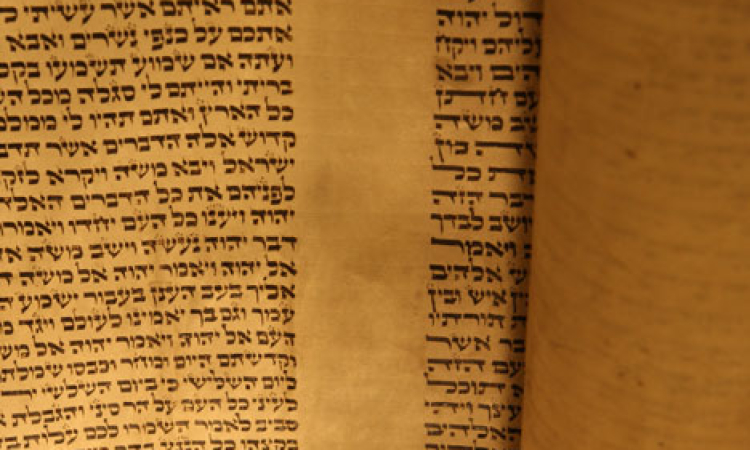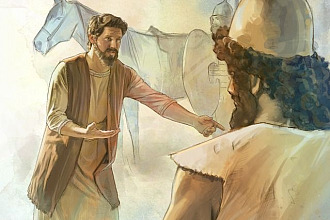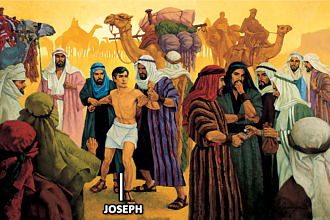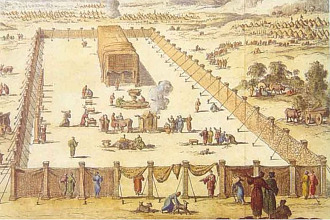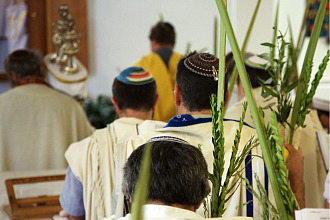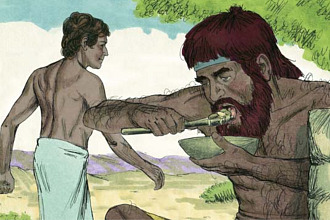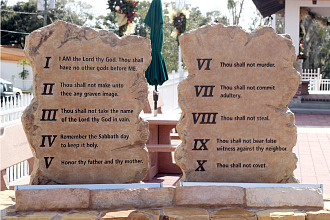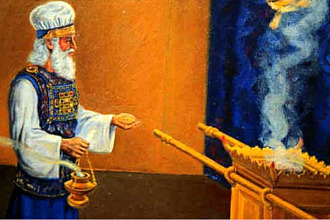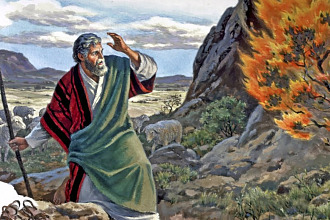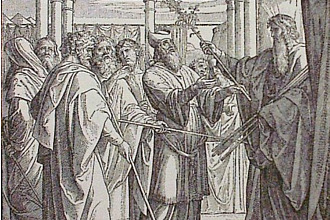Parasha for the Week: Re’eh Deuteronomy 11:26 – 16:27
Haftara for the Week: Isaiah 54:22 – 55:5
Besorat Yeshua: Mark 6:53 – 7:8
Overview
Moshe presents the blessings of following God, and the curses of rejecting His counsel.
When the nation enters Eretz Yisrael they must burn down any trees that had been used for idol-worship, and destroy all idolatrous statues. Hashem will choose only one place where the Divine Presence will dwell. Offerings may be brought only there; not to a private altar.
Moshe repeatedly warns against eating animal blood. In the desert, all meat was slaughtered in the Mishkan, but in Eretz Yisrael meat may be shechted anywhere.
Moshe lists the categories of food that may be eaten.
He warns the nation against copying ways of the other nations.
Since the Torah is complete and perfect, nothing may be added or subtracted from it.
If a “prophet” teaches to abandon the Torah or indulge in idol worship, he is to be put to death.
One who entices others to worship idols is to be put to death. A city of idolatry must be razed.
It is prohibited to show excessive signs of mourning - marking the skin or making a bald spot.
Moshe reiterates the classifications of kosher and non-kosher food.
Produce of the second tithe must be eaten in Jerusalem.
In certain years the second tithe is given to the poor.
Bnei Yisrael are instructed to always be open-hearted, and in the seventh year any loans must be discounted—Hashem will bless the person in all ways.
A Jewish bondsman is released after six years, and must be sent away with generous provisions. If he chooses to stay, his ear is pierced with an awl at the door post.
A description of the three pilgrimage festivals of Pesach, Shavuot, and Succot.
"Freedom of Choice"
This week’s Parasha begins, “See, (Re’eh) I set before you this day a blessing and a curse . . . . The blessing, if you will listen to the commandments of the L-rd your G-d, which I command you this day and the curse if you shall not hearken to the commandments...” (Deut. 11:26-28)
G-d gave us “freedom of choice.” He gave us the ability to choose the paths which lead to blessings or curses. We have the choice to make good or bad, it is our privilege to choose the good path, which lead to heaven. However, we do not serve G-d for the sake of reward. We perform the mitzvot and do good because of we love G-d and want to please him.
“Every Act of Every Individual is Important”
This week’s Parasha, Re’eh, begins, “See, I set before you this day a blessing...” Our sages ask, “Why does Moshe begin with “Re’eh,” in the singular, as if speaking to each individual, while the rest of the verse is plural (“all of you”)? Iben Ezra explains that Moshe wants to emphasize the importance and effect which each individual has not only upon oneself, but upon the entire nation. Moshe begins by addressing the individual! Observe G-d’s commandments even though you are only one person. Do not think of yourself as insignificant, for each and every individual can influence and bring blessings to the entire nation and indeed the entire world!”
“See it By Faith”
As mentioned the name of the Parasha, “Re’eh,” means “see.” The Torah implies that our conviction and faith bring blessings should be so strong as if we see it. A poor man was offered a job with a nice salary and benefits. He ran home to tell his family. Their excitement and rejoicing was heard in the street for a distance away. When people came and inquired about the celebration, the poor man told them of his good fortune. “But you haven’t collected the money yet! You haven’t worked one day for the company nor collected your first pay check, you are still poor and do not have a penny more now than you had yesterday, so why are you joyous now?” “You speak like fools,” responded the poor man. “True, I do not have the money yet, but the very fact that I have been promised the job and the salary makes me feel as if I already have it in my pocket!” God’s promised blessings are more sure than any human being or company could offer us. If we would rejoice because of a human promise how much more should we rejoice at the hundreds of promises God promises us. Our belief that G-d will reward us must be so strong that the blessings which G-d has promised us in the Torah should be fixed in our minds as if we “see” them. We must know by faith that G-d will ultimately grant us our reward.
Rabbi Shaul knew this principle when he said: “faith is the assurance of things hoped for, the conviction of things not seen.” “By faith Abraham obeyed when he was called to set out for a place that he was to receive as an inheritance; and he set out, not knowing where he was going. By faith he stayed for a time in the land he had been promised, as in a foreign land, living in tents, as did Isaac and Jacob, who were heirs with him of the same promise. For he looked forward to the city that has foundations, whose architect and builder is God.” (Heb. 11:1, 8-10.)
“Giving Tithes”
The mitzvah of giving tithes (10 percent) is expressed in this Parasha with the words, “Aser TeAser” which can also be read as “Aser TeAsher” which means “give tithes and you shall be wealthy” or “give tithes and you will be happy.” The Torah tells us that through giving tithes one will gain wealth and be happy. Wealth itself does not bring happiness but wealth that is bestowed upon us as we return God’s tithe brings true happiness. The Talmud tells a parable concerning tithes. Two sheep were crossing the river. One was sheared and the other not. The one full of wool mocked the sheared one for letting herself be sheared. But as they went deeper into the water, its wool absorbed the water and it sank. The one who was sheared made it across safely. “So too,” says the Talmud, “Whoever ‘shears’ his possessions and gives tithes will make it across safely and be saved in this world and in the World-to-Come.”
“Kosher Food”
The two signs of a kosher animals is that they chew their cud (“maalei geira”) and have split hooves (“mafris parsa”). Kosher fish must have fins and scales. The Torah doesn’t give any signs for birds, but mentions which ones are the non-kosher ones. However, today animals are so sick that we should be very careful before eating them. Maybe it is time for us to come back to the ideal foods, which God gave to Adam and Eve in Eden: “God said, ‘See, I have given you every plant yielding seed that is upon the face of all the earth, and every tree with seed in its fruit; you shall have them for food.’” (Gen. 1:29) and after the sin G-d added all kind of herbs which are good for curing sickness “and you shall eat the plants of the field.” (Gen 3:18).
“The Greatest is Not the One Who Gives”
A rabbi came to a wealthy businessman and asked him to contribute a large sum for a Yeshiva. The rich man replied, “I need to think about this. Come back tomorrow.” When the rabbi came the next day the check was already prepared. “I have decided to contribute the amount you asked. However, I want you to explain the words of the Talmud, ‘Greater is the one who influences others to give than the one who gives.’ How is it possible that I’m contributing such a large sum, yet, your deed is greater than mine?” The rabbi replied: “There is no question that your mitzvah and its reward is great. However, the courage and, at times, the embarrassment one experiences when collecting for charity can make it more difficult than giving.”
“A Light in Our Path”
The books of Proverbs and Psalms compared the mitzvot to a lamp and a light in our path (Proverbs 6:23 and Psalm 119:105). Our sages explain the comparison as follows: “Just as from one candle a person can light many candles without diminishing any of the light from the original candle, so too, through the performance of charity, one’s wealth is not diminished.”
HAFTARA Isaiah 54:11 – 55;5
This Shabbat is the third Shabbat after Tisha B’Av. We are in a period called Shiva D’nechemta—”Seven weeks of comfort.” The seven Haftarot of the weeks between Tish’a B’av and Rosh Hashana are prophesies of comfort and hope for Israel and God’s people at large.
Haftara: The text of Isaiah continues to comfort Israel. “O afflicted one, storm-tossed, and not comforted, I am about to set your stones in antimony, and lay your foundations with sapphires. I will make your pinnacles of rubies, your gates of jewels, and all your wall of precious stones. All your children shall be taught by the LORD, and great shall be the prosperity of your children” (Is. 54:11-13). In Zechariah God promised “I will pour out a spirit of compassion and supplication on the house of David and the inhabitants of Jerusalem, so that, when they look on the one whom they have pierced, they shall mourn for him, as one mourns for an only child, and weep bitterly over him, as one weeps over a firstborn” (Zech 12:10). G-d will pour out his Spirit on Israel and will teach them about the Messiah who has been pierced.
Israel has suffered. She has been persecuted by those who should be the first to show them love. In order not to feel guilty, they say that all these sufferings came from G-d because of Israel’s rejection of the Messiah. But the Lord said “If anyone stirs up strife, it is not from me; whoever stirs up strife with you shall fall because of you” (15). It is not from the Lord. That is a great comfort for Israel. It is better to be on the side of God. That is why it is better not to curse Israel, and not to build any weapon against her. “No weapon that is fashioned against you shall prosper, and you shall refute every tongue that rises against you in judgment. This is the heritage of the servants of the LORD and their vindication from me, says the LORD” (17).
The next chapter is a new call from the Lord to Israel. “Incline your ear, and come to me; listen, so that you may live. I will make with you an everlasting covenant, my steadfast, sure love for David” (Is. 53:3). Paul confirms this with “as regards election they are beloved” (Rom 11:28).
Besorat Yeshua Mark 6:53 – 7:8
Besorah: Yeshua comforts those who need to be comforted. After comforting Israel He crossed over to the other side of the Sea of Galilee. “They came to land at Gennesaret” (Mark 6:53). Yeshua demonstrated compassion to the Gentiles. “Wherever he went, into villages or cities or farms, they laid the sick in the marketplaces, and begged him that they might touch even the fringe of his cloak; and all who touched it were healed” (Mark 6:55- 56).

